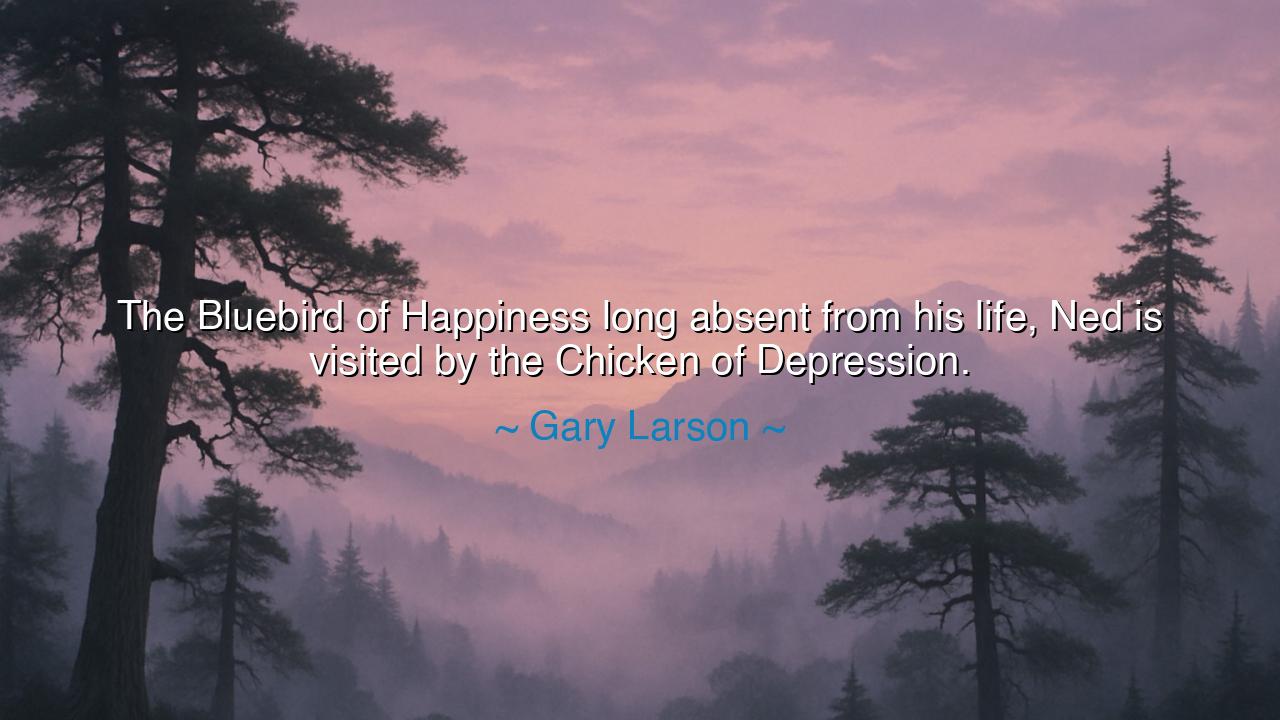
The Bluebird of Happiness long absent from his life, Ned is
The Bluebird of Happiness long absent from his life, Ned is visited by the Chicken of Depression.






When Gary Larson, the creator of The Far Side, penned the line, “The Bluebird of Happiness long absent from his life, Ned is visited by the Chicken of Depression,” he clothed profound truth in the garments of humor. Beneath its absurd and comical surface lies a reflection on the fragile and shifting nature of the human spirit — how joy and sorrow are strange companions, each visiting in turn, and how often melancholy descends not as a roaring beast, but as a quiet, ridiculous bird that perches uninvited upon the soul. In Larson’s humor, there is an ancient wisdom: that laughter itself is a form of understanding, and through the lens of irony we often glimpse the deepest truths about happiness, despair, and endurance.
The Bluebird of Happiness has long been a symbol in Western folklore — an emblem of hope, renewal, and the childlike joy that all souls seek. From ancient myth to modern tale, the bluebird represents the soul’s yearning for light, the promise of dawn after darkness. Larson, however, reverses the image with the precision of a philosopher disguised as a jester. In place of the radiant bluebird, he gives us the humble Chicken of Depression — awkward, ungainly, and comic in its very sadness. The image is absurd, but therein lies its brilliance: Larson reminds us that depression is not always noble or dramatic, but ordinary, almost silly in its persistence. It is not a dragon that burns the heart, but a clucking creature that pecks at the corners of our peace. And yet, through humor, he invites us to confront it without shame, to see that even sorrow, when faced with laughter, loses some of its sting.
In this way, Larson joins a long lineage of thinkers and storytellers who have used humor as wisdom’s disguise. The ancient Greeks revered the comic playwright Aristophanes, whose laughter exposed the follies of men; the medieval fools in royal courts spoke truth under the veil of jest; and even the prophets of old, though stern, sometimes mocked the pretensions of power to awaken humility. For laughter is a divine mirror: it allows us to see our struggles from above, to glimpse ourselves as we are — frail, yearning, ridiculous, and beautiful all at once. Thus, the Chicken of Depression is not merely a joke; it is a parable of perspective. It teaches that when sorrow visits, we need not banish it with despair, but may instead disarm it with awareness — perhaps even with a smile.
Consider, for a moment, the story of Abraham Lincoln, who bore the weight of both nation and melancholy upon his shoulders. Those close to him wrote that he often fell into deep sadness, calling it “the black dog,” yet he was also known for his keen wit and endless humor. In the darkest days of the Civil War, he would tell stories and jokes not out of triviality, but out of necessity — as a shield against the suffocating heaviness of grief. His laughter was not denial, but courage; it was his way of reminding himself, and others, that despair must never have the final word. Like Larson’s “chicken,” Lincoln’s depression was ever near, but he learned to coexist with it, to find dignity and purpose even in its shadow.
The origin of Larson’s quote lies in this same paradox — that humor and sadness are not enemies, but partners in the human condition. The more we chase happiness as something permanent, the more we despair when it flies away. But when we learn to accept life’s rhythm — the coming and going of the bluebird and the chicken alike — we discover a deeper serenity. Happiness is not constant light, and depression is not eternal darkness; both are visitors, reflections of the same truth: that to feel deeply, to live fully, is to encounter both the tender and the absurd. Larson’s wisdom is that we can survive both — and even laugh in the midst of it.
To laugh at one’s pain is not to diminish it, but to rise above it. The ancients taught that laughter purifies the soul because it is an act of transcendence — a refusal to let sorrow define us. By giving depression a comic form, Larson robs it of its tyranny. He reminds us that despair, no matter how heavy, is never all-powerful. If we can still see the absurdity in our suffering, if we can still chuckle at the “chicken” that comes to roost, then somewhere deep within, the bluebird still sings — waiting for its time to return.
So, my listener, take this teaching to heart: when the days grow dim and the Bluebird of Happiness seems long absent, do not curse the silence or fear the chicken that appears in its place. Greet it with humor, patience, and gentle understanding. Remember that no sorrow is forever, and no laughter is wasted. Feed your spirit with kindness, find joy in small things, and when you can — laugh, even through tears. For as Gary Larson, the sage in the guise of a cartoonist, reminds us: happiness and sadness are both part of the great comedy of life, and wisdom lies not in avoiding one, but in learning to dance with both — the bluebird and the chicken, the light and the shadow — until, through laughter, your soul becomes whole again.






AAdministratorAdministrator
Welcome, honored guests. Please leave a comment, we will respond soon